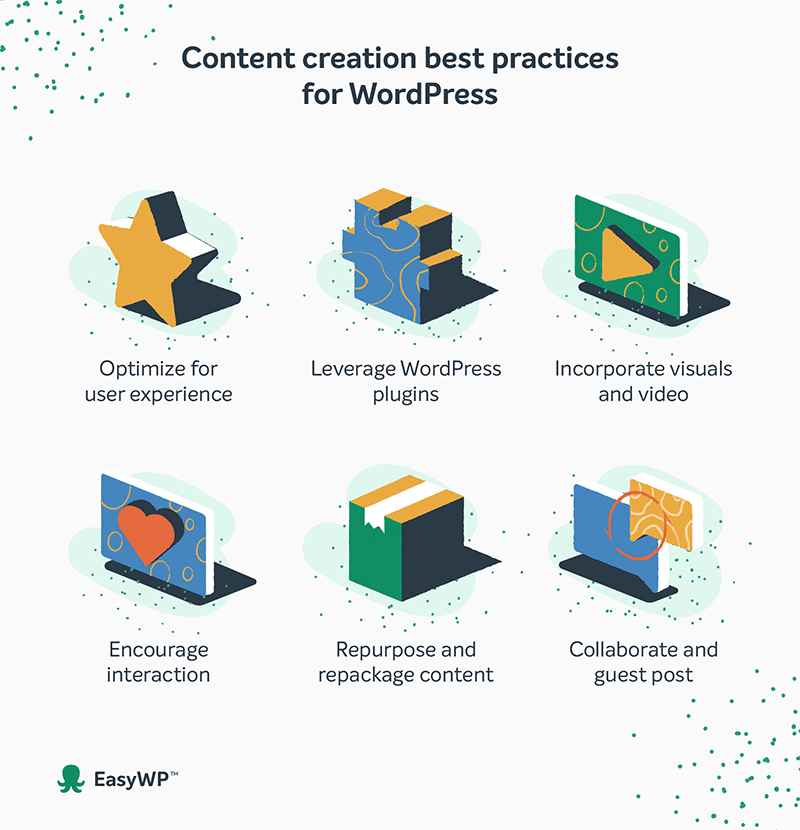How to craft the best content marketing strategy for WordPress


Content marketing strategy is the fuel that propels WordPress businesses to establish their online presence, captivate audiences, and forge lasting connections with their target markets. For WordPress site owners, embracing a strategic content marketing approach is central to achieving long-term success and growth.
This comprehensive guide delves into the big world of content marketing, giving you the knowledge and tools to craft a winning strategy tailored to your WordPress site.
Content marketing: the cornerstone of online success
Forget the old-school “hard sell” tactics. Content marketing is a strategic approach focused on creating and distributing valuable, relevant, and consistent content to attract and retain a clearly defined audience. It’s a departure from the traditional, interruptive advertising methods, offering a more organic way to connect with your target audience.
The essence of content marketing revolves around the intent to provide useful information that resonates with your audience’s interests, pain points, and aspirations. By positioning your brand as a trusted leader in your industry, you establish a rapport with your audience, building trust and loyalty that later translates into better brand awareness, lead generation, and sales.
The power of content on WordPress sites
WordPress provides an ideal platform for implementing a robust content marketing strategy. With its user-friendly interface, vast array of plugins, and seamless integration with various marketing tools, WordPress empowers site owners to create, manage, and distribute content efficiently and effectively.

Embracing content marketing for your WordPress site offers many benefits, including:
- Increased brand awareness – By consistently publishing informative and engaging content, you position your brand as a thought leader in your industry, enhancing your credibility and building trust with your audience.
- Cost-effective leads – Content marketing allows you to attract and nurture potential customers organically, reducing the need for expensive advertising campaigns and providing a higher return on investment (ROI).
- Versatility and scalability – WordPress’s flexibility and scalability allow you to customize your site content strategy to evolving trends, technologies, and audience tastes, ensuring long-term success.
- Effective content distribution – Utilizing social media channels alongside email newsletters and your website helps promote and draw visitors to your content, expanding your reach and impact.
Crafting a winning content marketing strategy
Creating content that resonates with your target audience is crucial, as it ensures engagement and relevance. Here are the key steps to follow:
1. Define your goals and target audience
Before embarking on your content marketing journey, clearly define your goals and target audience. Ask yourself:
- What are your primary business goals? (increased brand awareness, lead generation, customer retention)
- Who is your ideal customer persona? (demographics, interests, pain points, buying behavior)
- How can content marketing support your goals and cater to your target audience?
Handling these questions can help you build a successful content marketing strategy that aligns with your business needs, and connects you with more people.

2. Conduct thorough research
To create content that truly connects with your audience, you must understand their needs, preferences, and online behavior. Conduct thorough research to gather insights into:
- Topics and keywords your target audience is searching for
- Types of content they engage with most (e.g., blog posts, videos, infographics)
- Platforms and channels they frequently use (e.g., social media, forums, industry publications)
- Your competitors’ content marketing strategies and the gaps you can fill
Additionally, seek inspiration from successful content marketing examples to identify effective strategies and techniques. Find out more in our Guru Guides section dedicated to creating content.
3. Develop a content editorial calendar
Based on your research findings, craft a content strategy that summarizes the kinds of content you’ll produce, the topics you’ll cover, and the channels you’ll use for distribution. Additionally, create an editorial calendar to ensure a consistent and organized content publishing schedule. Ensuring that all team members are on the same page is crucial to minimize duplicated efforts and ensure cohesive collaboration is crucial.
4. Produce high-quality, engaging content
With your content strategy in place, it’s time to create compelling content that captivates your audience. Based on your goals, you can look at various content formats, such as:
- WordPress blog posts – Informative articles, tutorials, listicles, and thought leadership pieces
- Visual content – Infographics, images, videos, and interactive media
- Podcasts – Audio content that allows you to engage with your audience on-the-go
- Webinars and live streams – Interactive educational sessions or product demonstrations
- Case studies – In-depth, research-based content that showcases your expertise
5. Optimize for search engines
Optimizing your content for search engines is important to maximizing its visibility and discoverability. Incorporate your target keywords into on-page copy, meta descriptions, and alt text for images while adhering to best practices for on-page SEO and technical SEO.
Promote and distribute your content
Content creation is only part of the journey — the second half lies in effective promotion and distribution. Leverage various channels to amplify your content’s reach, such as:
- Social media platforms (e.g., Facebook, Twitter, LinkedIn, Instagram). Tailor your content for various social media platforms as part of your comprehensive social media plan.
- Email marketing campaigns
- Influencer collaborations and guest posting opportunities
- Content syndication and distribution platforms
Analyze and refine your strategy
Always monitor and analyze the performance of your content marketing efforts. Use tools like Google Analytics, Rank Math, and RelateSEO to track metrics such as website traffic, engagement rates, lead generation, and conversions. Based on your findings, refine your strategy, experiment with new content formats or topics, and optimize your approach for better results.
Content creation best practices for WordPress sites
While WordPress provides a powerful platform for content creation and management, several best practices should be considered to ensure your content stands out and resonates with your audience. Planning and scheduling content in advance using collaboration tools and content calendars can streamline the content creation process.

Optimize for user experience
User experience (UX) is paramount in content marketing. Ensure your WordPress site is mobile-friendly, has a neat and intuitive design, and offers an easy-to-follow experience. Additionally, prioritize readability by using clear headings, short paragraphs, and visually appealing formatting.
Leverage WordPress plugins
WordPress offers a vast ecosystem of plugins to enhance your content creation and marketing efforts. Explore plugins for SEO optimization, social media integration, content curation, and analytics to streamline your workflow and maximize your content’s impact.
Incorporate visuals and video
Visuals are powerful tools that can captivate your audience and enhance the overall appeal of your content. Include high-quality images, videos, infographics, and other visual elements to break up text-heavy content and create a more engaging experience.
Encourage interaction
Content marketing is a two-way street. Incorporate interactive elements such as polls, Q & As, and comment sections to encourage your audience to engage with your content. Respond promptly to comments and questions to foster a sense of community and build stronger relationships with your readers.
Repurpose and repackage content
Maximize the value of your content by repurposing and repackaging it into different formats. For example, you can turn a blog post into a video or an infographic, or compile a series of posts into an ebook or whitepaper.
Collaborate and guest post
Collaborating with industry influencers, thought leaders, and complementary brands can broaden your reach and expose your content to new audiences. Consider guest posting opportunities or inviting guest authors to contribute to your WordPress site. It’s crucial to ensure that all collaborators are on the same page to minimize duplicated efforts and ensure cohesive collaboration.
Leveraging AI for smarter content marketing
To stay ahead in the fast-evolving digital landscape, integrating AI tools into your content marketing strategy can give your WordPress site a competitive edge. AI-powered tools can streamline content creation, enhance SEO, and improve audience targeting.
How AI can enhance your content strategy:
- Automated content generation – AI-powered writing assistants like ChatGPT can help generate high-quality blog posts, product descriptions, and social media content in seconds.
- SEO optimization – AI-driven tools such as SurferSEO analyze search trends and optimize your content for higher rankings.
- Personalized content recommendations – Some AI tools help tailor content suggestions for individual visitors, improving engagement and retention.
- Chatbots and automated engagement – AI chatbots can assist with customer inquiries and guide visitors through your content funnel.
By leveraging AI in your WordPress content marketing strategy, you can save time, boost efficiency, and create a more engaging experience for your audience. Whether it’s through smarter keyword optimization or AI-generated insights, embracing automation can help your site stay relevant and competitive in the ever-changing digital landscape.
Measuring success: key metrics and analytics
To evaluate the effectiveness of your content marketing efforts and make data-driven decisions, it’s crucial to track and analyze relevant metrics. Here are some key performance indicators (KPIs) to consider:
- Website traffic — Monitor the number of unique visitors, page views, and traffic sources to gauge the reach and discoverability of your content. Track metrics such as time on page, bounce rate, and scroll depth to understand how well your content resonates with your audience.
- Lead generation and conversions — Measure the number of leads generated and conversions achieved through your content marketing efforts, such as form submissions, email subscriptions, or product purchases. You can also consider a web scraping API like ZenRows to extract relevant data from competitor websites, such as pricing trends, customer reviews, and engagement patterns, helping you identify what attracts potential customers. By analyzing this data, businesses can refine their lead generation strategies, optimize landing pages, and create targeted marketing campaigns that resonate better with their audience.
- Social media engagement — Analyze metrics like shares, likes, comments, and mentions to evaluate the effectiveness of your social media content promotion strategies. Use social media sites like TikTok and X to collect demographic information and customer feedback, leveraging tools like WPForms for more detailed insights.
- Search engine rankings — Monitor your keyword rankings and organic traffic to assess the impact of your SEO efforts and content optimization strategies.
- Return on investment (ROI) — Calculate the ROI by comparing the revenue generated from content marketing initiatives against the associated costs and resources invested.
Don’t be overwhelmed the first time you look at all of these numbers and percentages. It takes time to understand how each of them applies to your website in a practical way. But stay with it, and as you watch these metrics fluctuate over time, you’ll start getting ideas about how to respond.
Embracing content marketing for long-term success
Following the principles outlined in this comprehensive guide will enable you to craft a compelling content marketing strategy that fits your WordPress site’s unique needs. From defining your goals and conducting thorough research to producing high-quality, engaging content and optimizing for search engines, this guide provides a roadmap to success.
With WordPress as your powerful content management platform and this guide as your compass, you have the tools to unlock the full potential of content marketing and propel your WordPress site to new levels of success, engagement, and growth.
If this guide was helpful to you, please check out some of our other WordPress resources.
